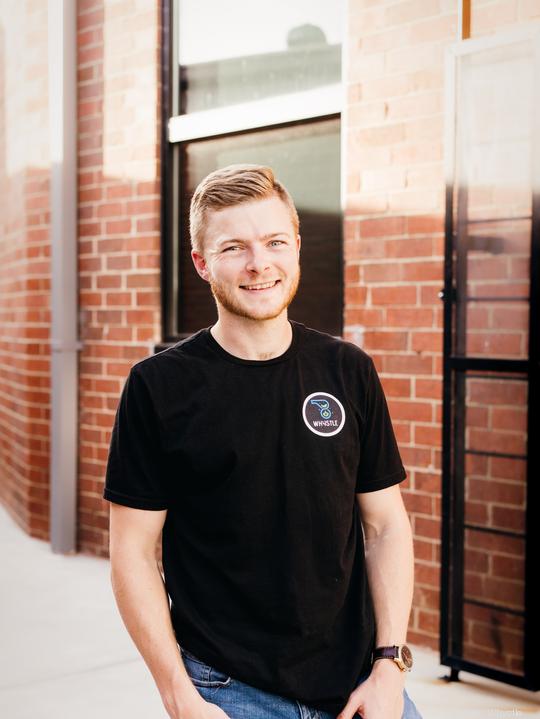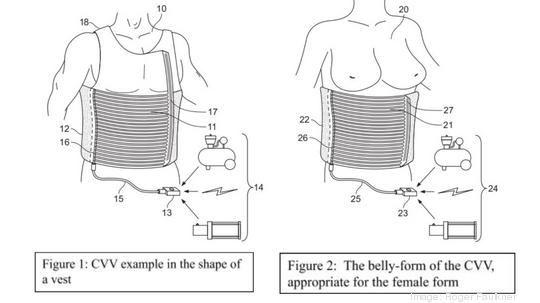No one really knew what to expect when Covid-19 swept through the U.S. in March.
Businesses and schools shut down with no real indication of when they would reopen. No individual, organization or company was immune, especially not startups.
To stay afloat, many found a way to lean into the growing crisis and pivot in ways that not only helped grow their businesses, but also made an important impact on those around them.
We're diving into five Charlotte founders and startups whose crisis innovations are paving the way for a safer, new normal.
Lucid Drone
Lucid Drone, a Charlotte-based drone tech startup, realized very early on that pivoting would be the only way to keep the business going strong.
The company, which connects power-pressure washers to drones for safer cleaning of building exteriors, was founded in 2017 by Andrew Ashur, David Danielson and Adrian Mayans. In early March, the team began to look at ways to repurpose the drone technology to combat Covid.
Ashur said they quickly figured out how to disburse sanitation solutions to minimize the virus' impact, with a focus on the inside of buildings. The solution breaks down contagions on high-contact surfaces, including fabrics and closed-container foods.
In the five months since putting their plan into motion, Lucid Drone leased its technology to one major SEC university earlier this month. They've also performed demos for about 25 teams in the NFL, NBA and NCAA.
"For the majority of stadiums, adding in this disinfecting step is a major line item, so for us to be able to empower them to lease our tech and have their team trained on how to use it gets rid of that headache and gives them the flexibility to use the technology as needed," he said.
Ashur said Lucid Drone was also recently contracted by a high school in Miami. He said being able to provide additional protections for schools is an important initiative because he grew up in a family of educators.
"Now we’ll be able to see how our tech can be helpful in the [school] environment as well," he added.
Whystle
Residential cleaning startup Whystle ran into similar challenges.
Founded in 2019 by Chris Wright, Whystle's goal was to give customers a fast, headache-free way to schedule and manage home cleaning appointments via a mobile app. Clients included apartments, single-family homes and short-term rentals in the greater Charlotte area.
But Wright realized the company's platform could fill a void in the small business space and quickly signed contracts with eight local businesses. Since May, Whystle has ramped up its services and was able to secure a contract with a major shipping and distribution company. They've also begun working with a number of schools, churches and gyms in the greater Charlotte region on commercial disinfecting and back-to-business action plans.
"It was a bit of being in the right place at the right time. Everyone just hustled to get the word out. We’d actually been reached out to by [the company] in March before we made our true pivot," he said. "They’ve actually recently decided they want us to bid on their commercial janitorial for the entire building."

Wright said moving forward the team intends to continue growing the commercial disinfecting and janitorial side of the company.
"We are truly trying to help people and spread as much information and education as possible... We’ve found a lot of businesses are working with limited resources after being closed," he said. "They’re struggling and can’t afford our services, but that doesn’t mean they can’t get our help."
MedCall Advisors
MedCall Advisors, a Cornelius-based tele-health platform, is using its resources to ensure colleges and businesses get the Covid testing they need to send students and employees safely back to work and school.
The startup, founded in 2018 by Randy Baker, uses technology to immediately connect someone experiencing a medical emergency to a board-certified physician. Baker said he recently partnered with diagnostics company MicroGenDX to provide Covid test kits to Davidson College students and faculty as they returned to campus last week.
"We send the test out and track those result, then send the list to the college,” he said. “And it’s not a one-and-done test. It will be ongoing testing for the campus population.”
Baker said the MicroGen test is a better, more accurate option because it’s based on a person’s DNA. Instead of a nasal swab, the test requires a person to cough then spit into a sterile container. Results are available within 48 hours.
According to a Brigham and Women's Hospital study published last month, sputum was determined to be more accurate in detecting Covid than nose or throat swabs.
“We’re able to control having the entire population take the same test… Consistency is critical in testing,” he said.
Roger Faulkner
For months, Davidson inventor and entrepreneur Roger Faulkner has poured his energy into creating a ventilator system that could change the way Covid patients receive care.
A new and recent partnership may just be the breakthrough he needs.
Faulkner suffers from ALS (amyotrophic lateral sclerosis) and has spent the past few years designing a portable ventilation system to improve his own quality of life. His Conformal Vest Ventilator provides a better alternative to the standard positive pressure ventilators, which often interfere with normal human interactions.
Eventually, Faulkner conceptualized a better alternative to single-patient ventilators currently used to treat Covid-19. His version, called the Shared Manifold Ventilator, would have the ability to serve up to 20 patients at the same time and can be produced using every day materials from stores like Home Depot and McMaster-Carr.
Faulkner said he spent the last four months working to find a partner who could help him bring his ventilator design to a manufacturer. In the process, he realized his original CVV design may actually be a viable alternative to avoid patient intubation.

"One of the problems leading to a lot of deaths is that people have to be intubated, which reduces a person’s chance of survival," he said. "The Conformal Vest Ventilator is a way they don’t have to be intubated."
"I thought at first that wasn’t really relevant, but after Covid-19 is over, there are going to be a lot of people with damaged lungs, and that [ventilator] is going to be great for them," he added.
Faulkner was recently introduced to Terence Fagan, cofounder of Bevel Design and mechanical engineering associate teaching professor at the UNCC. Fagan's expertise in bringing design to manufacturing led him and Faulkner to begin brainstorming and are working with Queens University and Charlotte MakerSpace on prototype development.
"[This ventilator] is an affordable way to save lives," Fagan said.
Druid
In June, agtech startup Druid pivoted away from its indoor farming platform and began producing 3-D masks.
The masks are made from PLA plastic and have removable inserts allowing for the wearer to change out the filters. The masks come in three styles and are available for purchase on the Druid website. The company has also set up a donation function so others can purchase masks for medical professionals.
“We started printing masks a few weeks after the start of the pandemic when it was reported that hospitals, nursing homes and other medical facilities were running low on PPE and were resorting to anything they could get their hands on,” Julian Walker, the Druid founder and CEO, previously told Inno. “Seeing our medical workers under-equipped for the crisis really motivated us do something.”



